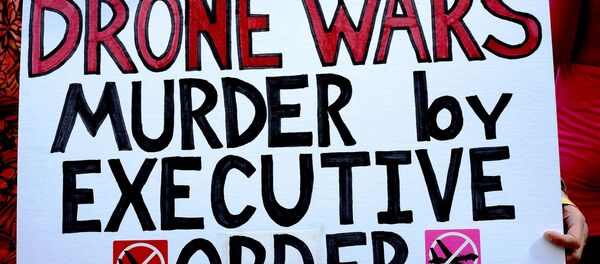Malik Jalal, a tribal elder from Waziristan, a border region between Pakistan and Afghanistan, says he has been targeted in at least four drones strikes, narrowly missing what he believes are attempts on his life.
Traveling to Britain following an invitation from Lord Ken MacDonald, the former Director of Prosecutions, Malik Jalal told BBC Radio 4 that he had been warned by various authorities in Waziristan that he is on a western "kill list" adding that his children are "terrified" of dying in an attack.
Meet Malik Jalal, who is on the US drone kill list: https://t.co/GBGsfMgNum He's in the UK to ask for govt's help: https://t.co/GhU9mZYALX
— Reprieve (@Reprieve) April 11, 2016
In one close call, he says a missile hit a car traveling behind him.
"I heard the explosion and the back window of my car shattered. The car behind was in flames and the passengers were in pieces."
A tribal elder of the region, Malik Jalal believes he is being targeted because of his connection with the North Waziristan Peace committee (NWPC) — a group facilitating peace talks between the Taliban and the Pakistani government.
'I Came Close to Being Bombed Four Times'
In a letter, addressed to UK Home Secretary Theresa May, who is responsible for MI5 and the National Crime Agency (NCA), and Foreign Secretary Philip Hammond, who has responsibility for GCHQ and MI6, Malik Jalal has called for a meeting to clear up concerns that he may be on a government kill list.
"I had a special role to improve security and we were making progress and that's why I think Americans targeted us […] I came close to being bombed four times, so in the end I realized they were on to me," he told the BBC.
"I have had to leave Waziristan. In my own family there are six people who are mentally destabilized because of the strikes. In Waziristan there are more than 400,000 people who have mental problems because of the drones. My own son is too scared to go back to Waziristan."
The US ambassador to the UK has also been copied into the letter, with Malik Jalal calling on Britain to try and influence the US to stop what he believes have been attempts on his life and others in Waziristan.
"I have a peaceful role in Pakistan. I am not involved in terrorism. I came to Britain because I feel like Britain is like a younger brother to America. I am telling Britain that America doesn't listen to us, so you tell them not to kill Waziristanis."
Concerns Over Long-Term UK Involvement in US 'Kill List'
The comments follow the release of an explosive report, accusing British law enforcement and intelligence agencies of drawing up an extra-judicial kill list targeting some of the world's most wanted terror suspects and drug smugglers.
The report, released by human rights organization Reprieve, claimed that the UK has been a long-time partner in the US' "shoot to kill" policy in Afghanistan and Pakistan, with the report alleging that drug smugglers, as well as terrorists were among those targeted.
"Britain's Kill List": @Reprieve's full report is at https://t.co/iFuKfJpUbJ.
— Shoaib M Khan (@ShoaibMKhan) April 10, 2016
Even the chapter titles are chilling, pic.twitter.com/RjyCmvcrN1
The findings follow a separate Vice News investigation that claimed that UK military personnel were exploiting a legal loophole to play a "critical" role in the US drone kill list program in Yemen.
Citing interviews with more than two dozen current and former British, American and Yemeni officials, UK forces were alleged to have taken part in so-called "hits" in Yemen, "triangulating" intelligence for kill lists, and preparing "target packages."
The reports of long-time collaboration with the US shoot to kill policy have led to suggestions that UK Prime Minister David Cameron misled parliament on September 7, 2015, when he said that the assassination of two British nationals in Syria was a "new departure" for the UK.
Commenting on the latest developments, Clive Stafford Smith, Director of Reprieve, said: It is horrifying that, in the 21st Century, we have drawn up a list of people we want to kill.
"For a country that loudly proclaims its opposition to the death penalty even after a fair trial, the notion that we would execute him without a trial at all stunningly hypocritical. Malik Jalal puts a very human face on the horror of this policy."
The UK government has said they don't comment on matters of intelligence.



